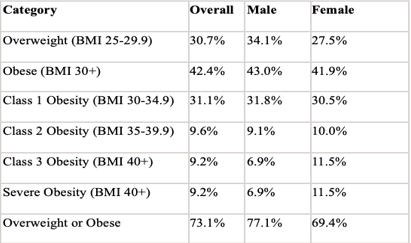Creating strategies for improving general health, according to research, is essential for addressing complicated global health problems, including obesity. These plans provide municipalities the ability to strategically deploy funds and organize their activities according to the evaluation of health gaps and requirements. Strategies that are grounded on evidence also encourage openness, responsibility, and involvement. They use quantifiable results to gauge development. It is essential to evaluate and thoroughly modify methods based on proof. In general, based on information focused on community management promotes equality, focuses efforts forward, and addresses the structural causes of obesity in various groups (Centers for Disease Control and Prevention, 2019).
Environmental and Epidemiological Data
In the US, obesity is a serious public health concern. Key findings from recent national surveys (CDC, 2022; Food et al. Center, 2020; National Institute of Diabetes and Digestive and Kidney Diseases, 2021) on the overall incidence of overweight and obesity amongst Americans of all ages are shown in the data table as follows:
Table 1: Statistical data on obesity in the United States

Approximately 3 out of 4 individuals in the United States are overweight or obese (73.1%), according to the statistics in the table, which shows unacceptably high proportions of these conditions across adult Americans. There is a noticeable increase in the incidence of obesity in particular categories, such as men vs women in overweight (34.1% vs. 27.5%) and women versus men for serious weight gain (11.5% vs. 6.9%) (CDC, 2022). According to these figures, overweight is a serious public health concern that requires immediate response. External factors, such as limited availability of nutrient-dense meals, insufficient resources for physical exercise, or obesogenic architectural landscapes in many places, mostly cause increased numbers of obese people. The information is derived from the most current findings of the Food Research and Action Center (2020), which provide highly accurate and reliable, broadly representative standard metrics. The report emphasizes how severe the crisis of obesity is and how proven remedies are needed, with a focus on inequalities that primarily affect disadvantaged demographic categories (CDC, 2019).
Ethical Health Improvement Plan
Contextual constraints like restricted access to nutrient-dense meals and a shortage of secure parks or playgrounds should be taken into consideration in any ethical health enhancement strategy aimed at reducing obesity. Along with high levels of crime, it has to address how inequality limits access to healthy options and discourages exercising outdoors. In order to empower vulnerable populations and bring about real improvements, these obstacles must be sensitively overcome. Minorities are particularly affected by these barriers, which exacerbate inequality (Wolfenden et al., 2020).
A focused strategy with quantifiable results is essential for ethically addressing obesity. Initially, in order to improve the accessibility of reasonably priced, healthful food alternatives, authorities should provide financing and opportunities for convenience stores to develop in marginalized communities. High-risk groups need to be covered by medical plans for diabetes tests and counseling regarding nutrition. Schools need to restrict access to nutritious foods and beverages and develop strong exercise programs. Governments at the local level must increase the number of secure outdoor recreation areas in areas of low income. Together, these groups of people may take concerted action to lower the overweight and obesity rate, especially for the most disadvantaged. Quantifiable decreases should be tracked to show moral success against the current health crisis. To encourage nutritious habits while honoring dietary practices, appropriately culturally sensitive outreach and training are required (Platter et al., 2021).
Reductions in BMI and instances of obesity among high-risk groups must be measured as a success criterion. Surveys must nevertheless also monitor better medical habits and expanded possibilities for fitness and dietary options. To direct future attempts and legislative adjustments, data collecting ought to reveal any gaps that still exist. A moral strategy may modify the growing obesity epidemic sloped with coordinated, sympathetic initiatives that concentrate on the ones who are affected. It is equally vital that these programs encourage populations to drive remedies while hospitals and clinics provide proper